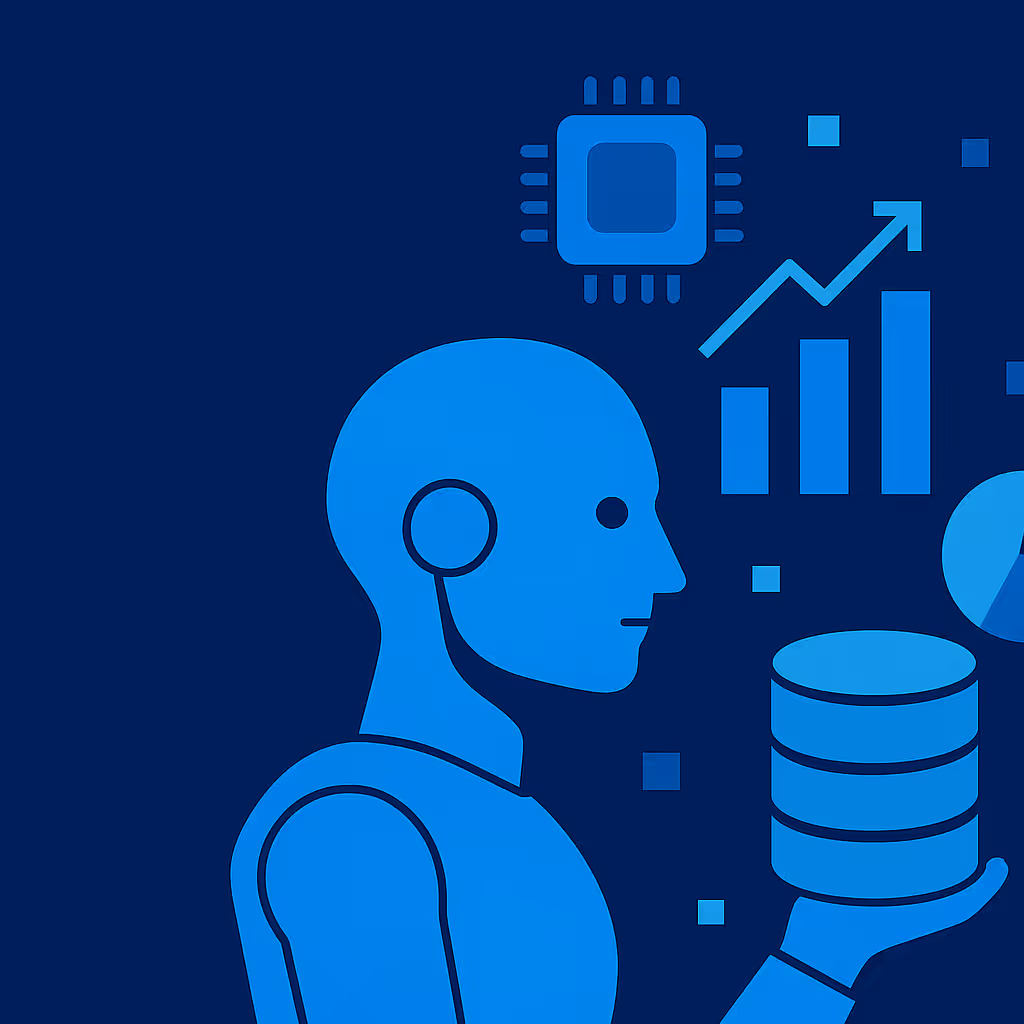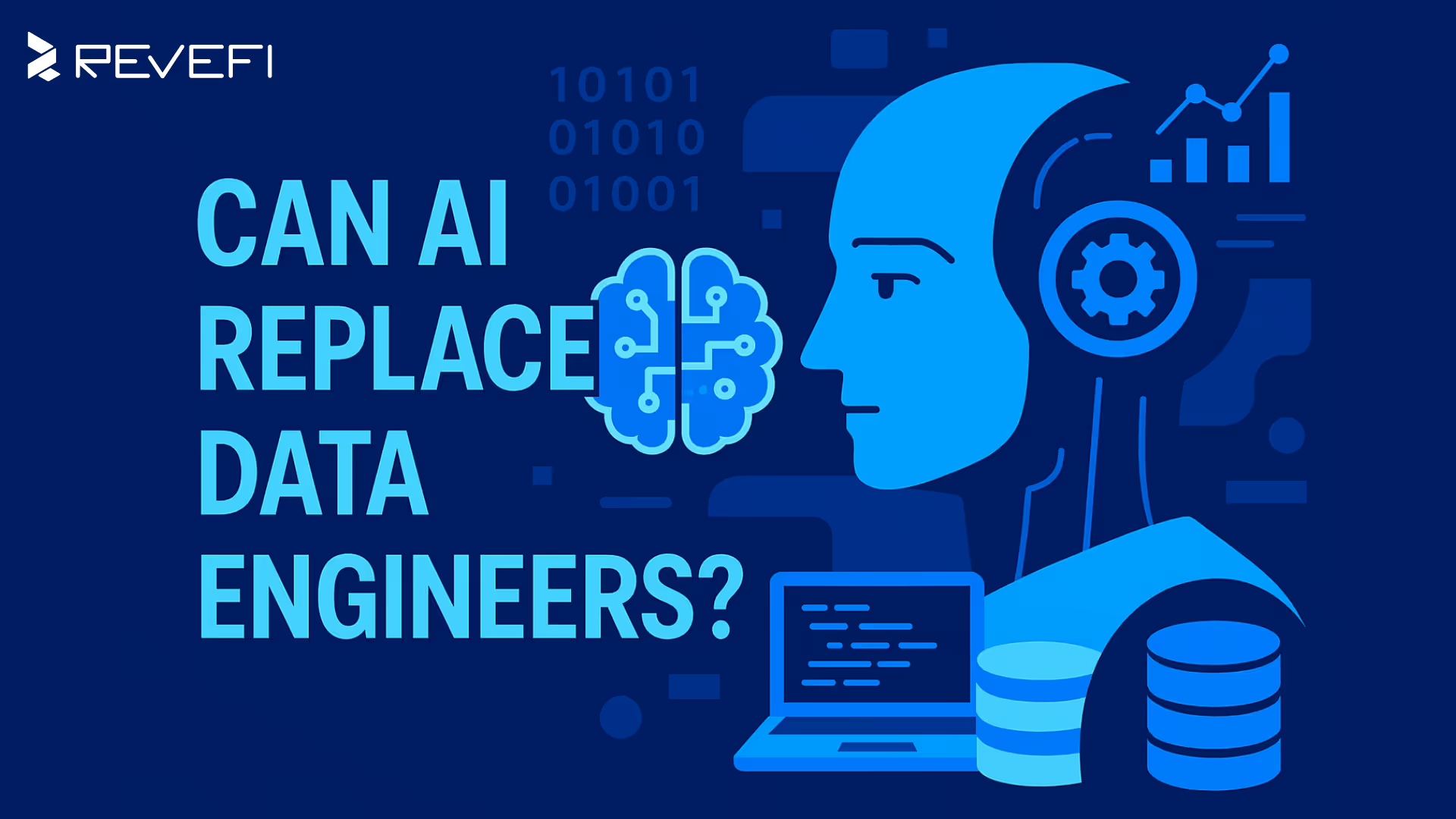Our Take on AI’s Role in Data Management and Data Analytics
Everywhere you look, there’s talk about AI automating jobs and possibly replacing humans. For data engineers, this raises a real concern: Will AI make my role obsolete? The fear isn’t just about automation, it’s about losing control over the very systems you build and manage.
It’s natural to feel uneasy with constant headlines about AI advancements. But when you look past the buzz, the reality becomes clear: AI isn’t here to take your place—it’s here to enhance what you do.
Instead of seeing AI as a threat, think of it as an upgrade to your workflow and team. From automating tedious processes to finding out deeper insights, AI is reshaping the way data is managed and analyzed.
AI’s Impact on Data Management and Data Analytics
AI has been making waves across every corner of technology, and data management is no exception.
The ability of AI systems to process and analyze vast amounts of data with speed and precision is transforming the way organizations manage their information.
- Automation of Routine Tasks: AI can handle repetitive tasks such as data cleaning, validation, and even preliminary analysis. This frees up data engineers to focus on more complex challenges and strategic planning.
- Enhanced Data Quality: With machine learning algorithms identifying anomalies and inconsistencies, data quality is improving. This means that when decisions are made, they’re backed by cleaner, more reliable data.
- Predictive Analytics: AI’s predictive capabilities allow for proactive decision-making. Instead of reacting to problems as they arise, businesses can anticipate trends and mitigate risks ahead of time.
While these advances are impressive, they only scratch the surface. AI’s true strength lies in its ability to work in tandem with human expertise, not in replacing it.
Generative AI (Gen AI) is changing the way data is analyzed, making it harder to separate human work from machine-driven processes. These AI models can create reports, insights, and even visuals based on raw data. But despite their advanced capabilities, they still have limitations.
Context Matters: AI can recognize patterns and generate reports, but it doesn’t always understand why those patterns exist. For example, did a trend emerge due to market changes or an external event? Human intuition is still needed to interpret the bigger picture.
Human Oversight is Key: Gen AI can suggest insights and visualizations, but a data engineer ensures they are accurate and aligned with business goals. AI is a tool, not a decision-maker.
In short, Gen AI is powerful, but it works best when guided by a skilled data engineer who can add the missing context and ensure meaningful results.

What is the Role of Data Engineers?
Often, the role of data engineers might seem like a catch-all for various technical responsibilities, but in reality, it’s a role defined by a unique blend of technical expertise and strategic insight.
Key Responsibilities
- Data Pipeline Development: Data engineers build and maintain the infrastructure that allows data to flow seamlessly from various sources into a unified system for analysis.
- Database Management: They design, implement, and optimize databases, ensuring that data storage is both efficient and secure.
- Data Integration and Transformation: Before data can be analyzed, it must be cleaned and structured. Data engineers are responsible for transforming raw data into a format that is usable for analytics.
- Scalability and Performance: As organizations grow, so do their data needs. Data engineers ensure that systems can scale and perform optimally under increasing loads.
Why Does Human Expertise Remain Essential?
While AI can automate many aspects of data management, it lacks the contextual understanding and creativity required for strategic problem-solving. Data engineers bring:
- Critical Thinking: They can evaluate the data within the context of a business’s unique goals and challenges.
- Domain Experience: Years of handling complex data systems allow them to foresee potential pitfalls and address issues that might not be evident from data alone.
- Innovation: Human ingenuity leads to innovative solutions that go beyond what current AI models are capable of generating on their own.
In short, the human element remains irreplaceable when it comes to interpreting and acting on data insights.
Is AI Replacing Data Engineering Jobs?
With AI advancing rapidly, many data engineers wonder: Will my role still exist in the future? While AI is automating certain tasks, it isn’t eliminating the need for human expertise—and here’s why.
Contextual Understanding: AI can process vast amounts of data, but it lacks industry-specific knowledge and business intuition—both essential for making sense of complex datasets.
Strategic Decision-Making: AI operates within predefined rules and training data. It can detect patterns but doesn’t understand business goals, trade-offs, or ethical considerations like a data engineer does.
Adaptability & Problem-Solving: Data pipelines often face unexpected errors—system failures, messy data, or shifting requirements. AI struggles with handling edge cases or making judgment calls when things don’t go as expected.
Can AI Realistically Replace Data Engineers? (Our Take)
Our perspective is clear: AI cannot—and should not—replace data engineers. Instead, it should be viewed as a powerful tool that enhances and augments their capabilities. AI streamlines repetitive tasks, processes vast amounts of data, and provides initial insights, but it lacks the critical thinking, context, and intuition that experienced professionals bring to the table.
By working together, AI and data engineers form a synergistic partnership—one where AI accelerates operations while humans make sense of the bigger picture, ensuring data-driven decisions align with business goals.
AI’s Strengths vs. Human Decision-Making
AI is exceptional at handling large-scale data operations, but when it comes to understanding nuances, solving complex problems, and making strategic decisions, human expertise remains irreplaceable.
What AI Excels At:
✅ Processing Large Data Sets at Unmatched Speed
AI can crunch numbers, analyze terabytes of data, and detect anomalies in seconds—tasks that would take humans days or weeks.
✅ Finding out Hidden Patterns & Trends
AI models use deep learning and pattern recognition to detect correlations that might not be immediately visible to humans, offering valuable insights.
✅ Automating Repetitive, Time-Consuming Tasks
From data cleaning and transformation to anomaly detection and report generation, AI removes the burden of manual labor, allowing engineers to focus on higher-value tasks.
Where Human Decision-Making is Essential:
Interpreting Data Within a Business Context
AI can recognize patterns, but it requires human expertise to understand why those patterns exist and whether they align with company goals.
Bringing Intuition & Industry Knowledge
Years of experience allow data engineers to recognize subtleties AI might miss—like seasonal trends, economic shifts, or external factors influencing data patterns.
Adapting to Unpredictable Challenges
Unlike AI, which follows predefined algorithms, humans can think critically, pivot strategies, and make informed decisions when unexpected issues arise.
The Human-AI Collaboration
Instead of viewing AI as a replacement, think of it as an advanced assistant that allows data engineers to focus on high-value tasks. Here’s how AI and human expertise complement each other:
How Can AI Assist Data Engineers?
So, if AI isn’t here to take over, what exactly can it do for data engineers? The answer lies in augmentation. AI isn’t a competitor but a collaborator that enhances how data engineers work.
The Risks of Relying Solely on AI
Despite its advancements, AI has clear limitations that make full reliance risky:
- Over-reliance on Automation: Trusting AI blindly can lead to errors going unnoticed, as systems operate strictly within their programming.
- Lack of Nuance: AI recognizes patterns but often misses the deeper context that experienced professionals can catch. This gap is critical in decision-making that impacts business strategy.
By integrating AI into workflows, data engineers can leverage its strengths while mitigating its weaknesses—much like having a highly efficient assistant for repetitive tasks, allowing professionals to focus on strategy and innovation.
- Enhanced Productivity: Automating routine processes frees up time for deeper analysis and problem-solving.
- Improved Accuracy: AI helps detect anomalies and maintain data consistency, reducing human error.
- Faster Insights: With AI crunching numbers, businesses can make real-time, data-driven decisions faster than ever.
How Revefi Brings AI-Augmented Data Engineering to Life
Revefi shows how AI can support data engineers rather than replace them. With its plug-and-play integration, you only need your metadata to get started. Within minutes, the platform automatically generates alerts and insights so your team can focus on high-impact work instead of manually monitoring data quality.
Built with GenAI and AI-driven automation, Revefi identifies and fixes critical issues fast—cutting debugging time from days to minutes. It also helps optimize costs, automate data quality checks, and improve system performance, reducing infrastructure expenses by 30-50% while increasing efficiency.
Revefi isn’t here to take over—it’s here to enhance your workflows and efficiency. With instant visibility, smart automation, and reliable data management, it empowers data teams to work smarter, faster, and more effectively.

The Future is Human + AI
At the end of the day, the narrative isn’t about a dystopian future where robots take over our jobs. Instead, it’s about a collaborative partnership between AI and data engineers
Data engineers are, and will continue to be, indispensable. Your expertise in designing robust systems, interpreting complex data, and making informed decisions is something no algorithm can replace.
Rather than fearing the rise of AI, consider it a powerful tool that can elevate your work, making your processes more efficient and your insights more actionable.
While AI can handle repetitive tasks and process data faster, it still needs human expertise for problem-solving, decision-making, and strategy.
The future belongs to those who embrace AI as a tool rather than seeing it as a threat. By learning how to integrate AI into workflows, data engineers can boost efficiency and focus on higher-value work.
Instead of worrying about AI taking over, see how it can enhance your work. Tools like Revefi help automate tedious tasks, so you can spend more time on what really matters. Explore Revefi today!




